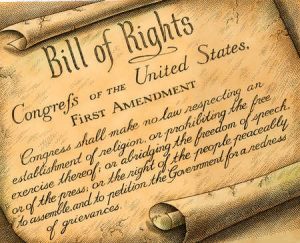 Let’s start off by taking a look at the First Amendment as it is written in the United States Constitution, “Congress shall make no law respecting an establishment of religion, or prohibiting the free exercise thereof; or abridging the freedom of speech, or of the press; or the right of the people peaceably to assemble, and to petition the government for a redress of grievances.”
Let’s start off by taking a look at the First Amendment as it is written in the United States Constitution, “Congress shall make no law respecting an establishment of religion, or prohibiting the free exercise thereof; or abridging the freedom of speech, or of the press; or the right of the people peaceably to assemble, and to petition the government for a redress of grievances.”
The intent of this amendment was essential to protect citizens from unfair prosecution or punishment if they made statements that were unpopular with others. But, how does the First Amendment stack up with regard to law enforcement officers? After all, they are citizens, aren’t they? Shouldn’t you as a police officer have the right to express your opinions?
Protected from Government Oppression
Ideally, the First Amendment was designed to protect an individual’s right to free speech without government oppression. At the same time, the amendment does not protect the individual from legal action taken on behalf of another individual or company. The story is a little different for police officers as they are considered to be a local, state, or federal employee. While they do still technically retain their First Amendment rights, how much of them they retain various depending on the facts and circumstances surrounding the case.
According to the findings in the case of Pickering vs. Board of Education 391 U.S. 563, 568 (1968), if a police officer is to have protected free speech, anything they say has to be “a matter of public concern. ” It was the court’s finding that a court will be the one to determine, on a case by case basis, whether a police officer’s speech or statement is a matter of public concern. The court also went on to say that, “public employees do not surrender all their First Amendment rights by reason of their employment.”
Speaking as a Member of the Public
Under this ruling, LEOs continue to enjoy their right to speak as a private citizen when they are talking about matters that are of public concern. It is up to the courts to decide what does or does not constitute a matter of public concern and whether the officer was speaking as a citizen, in which case his rights are fully protected under the First Amendment, or if he was speaking in an official capacity. If he was speaking as a police officer, his speech may not be protected.
No matter how you look at it, as a law enforcement officer, it is your job to police your speech and determine what may or may not be protected. Bear in mind that the concept of free speech and any violations of an officers right to it extend to the many forms of social media in use today, where so many inappropriate statements and comments appear on a daily basis. Expect new rules and regulations regarding what you, as a peace officer, need to do to avoid being caught up in this type of mess.
